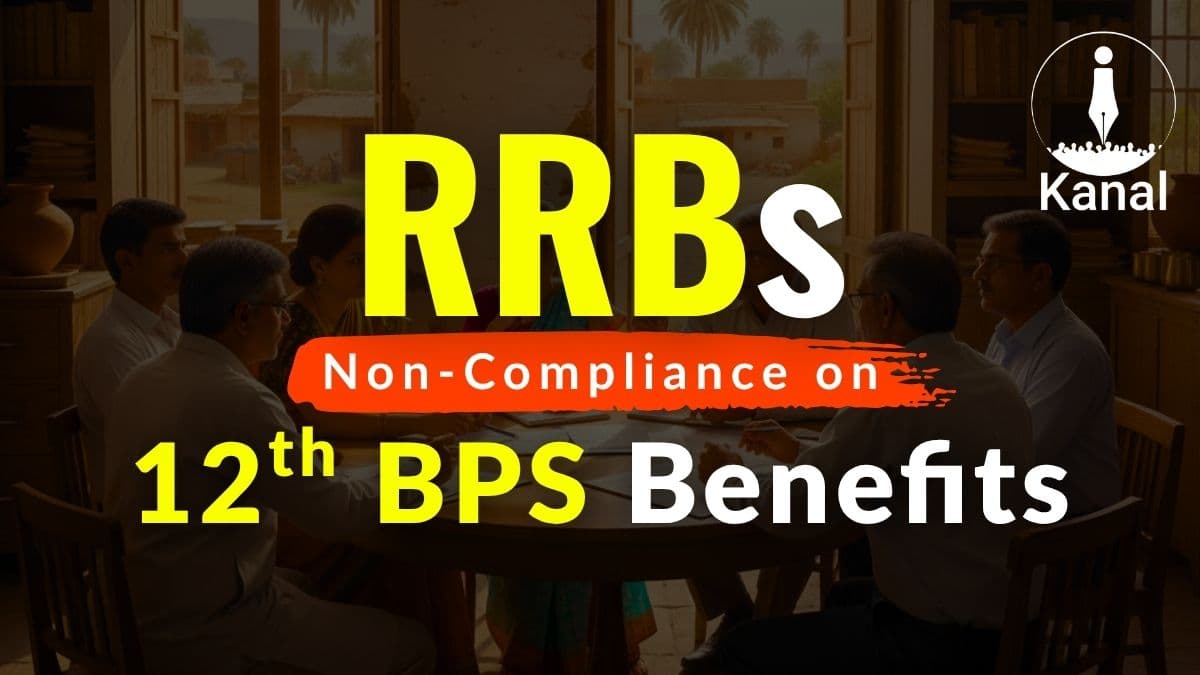Non-Compliance of RRBs on 12th BPS Implementation Raises Accountability Questions for Sponsor Banks
RRBs await 12th BPS benefits after a 16-month delay as sponsor banks and NABARD face rising questions over compliance and accountability.

Author: Saurav Kumar
Published: 7 hours ago
Sixteen months after the Government of India directed the rollout of 12th Bipartite Settlement (BPS) and 9th Joint Note benefits in Regional Rural Banks (RRBs), thousands of employees and retirees are still waiting for the complete implementation. Although July 2024 was set as the implementation timeline, several financial and service-related components remain unimplemented across multiple RRBs. The prolonged delay has triggered concerns over administrative inertia, sponsor bank reluctance, and NABARD’s ineffective oversight.
Advertisement
Employees say the issue has moved beyond procedure and now reflects a deeper pattern of systemic disregard for RRB workforce welfare.
Advertisement
Incomplete Implementation of 12th BPS Benefits
A review of benefit implementation across RRBs shows glaring inconsistencies. While a few banks such as Assam Gramin Bank, Karnataka Grameena Bank (KGB), Chhattisgarh Gramin Bank (CGB), Telangana Grameena Bank (TGB) and Tripura Gramin Bank (TGB) have implemented a majority of the 12th BPS components, many others have adopted only selected benefits or none at all.
Advertisement
Employees in banks like Manipur Rural Bank, Maharashtra Gramin Bank (MGB), Jammu and Kashmir Grameen Bank and Rajasthan Gramin Bank (RGB) have reported the most number of non-implementation of crucial allowances. Others such as Arunachal Pradesh Rural Bank have also reported payments or benefits requiring repeated manual claims.
Data accessed by Kanal from multiple RRBs shows that essential components such as special pay for Office Assistants, washing allowance, medical reimbursement, halting allowance and 150% HRA remain overdue in several banks.
A senior RRB employee said, on condition of anonymity, “The Government of India has been clear and consistent on implementing 12th BPS in RRBs. But sponsor banks are dragging their feet. The delay appears more like reluctance than oversight.”
In some banks, even basic allowances such as special area allowance or transport allowance have seen uneven and arbitrary implementation, widening disparity among employees across states.
Weak Monitoring
Retired staff—who remain among the most affected due to pending arrears—have expressed deep frustration with NABARD, which supervises RRBs and has its officials serving as directors on RRB boards.
A Telangana-based RRB retiree told Kanal, “NABARD’s monitoring on this issue is disappointing. Its officials sit on RRB boards, yet implementation is stuck for more than a year. This is a matter of utmost concern.”
Retirees argue that while sponsor banks are often blamed for resisting changes or delaying approval, NABARD’s inaction has allowed the non-compliance to continue unchecked.
Another former officer remarked, “If RRBs were commercial banks, such delays would never happen. RRB employees and pensioners do not get the same urgency from the system.”
Who Ensure’s Compliance?
RRBs sit at the intersection of multiple authorities: Government of India, sponsor banks, and NABARD. When implementation falters, responsibility becomes blurred. Who is ultimately accountable for ensuring that Government directives are executed in Regional Rural Banks?
As one frustrated employee of Assam Gramin Bank told Kanal, “When the Government issues an order, it must be implemented. If sponsor banks resist and NABARD fails to enforce compliance, whom should RRB employees approach for justice?”
He further added, “The delay in 12th BPS benefits is no longer just an administrative lapse — it has become a test of fairness and institutional accountability. As RRBs expand their rural credit responsibilities, unresolved wage parity and benefit delays are eroding morale and undermining the dignity of the workforce.”
The larger questions now demand urgent answers: Will sponsor banks finally comply without further delay? Will NABARD enforce strict monitoring? Will the Government step in to ensure uniform implementation across all RRBs?
Comments
- T J N RAMESH KUMAR
NABARD,RBI, SPONSOR Bank directors are not playing their role in board meeting of RRB. They are visiting board meeting place and simply and nodding their heads to the decisions of chairman. For that they are honoured by conducting free visits to the places where they can enjoy. After board meeting they were gifted with silver articles with bank money. Can they do any thing against the bank management after licking gifts.
Posted on 2 hours ago
